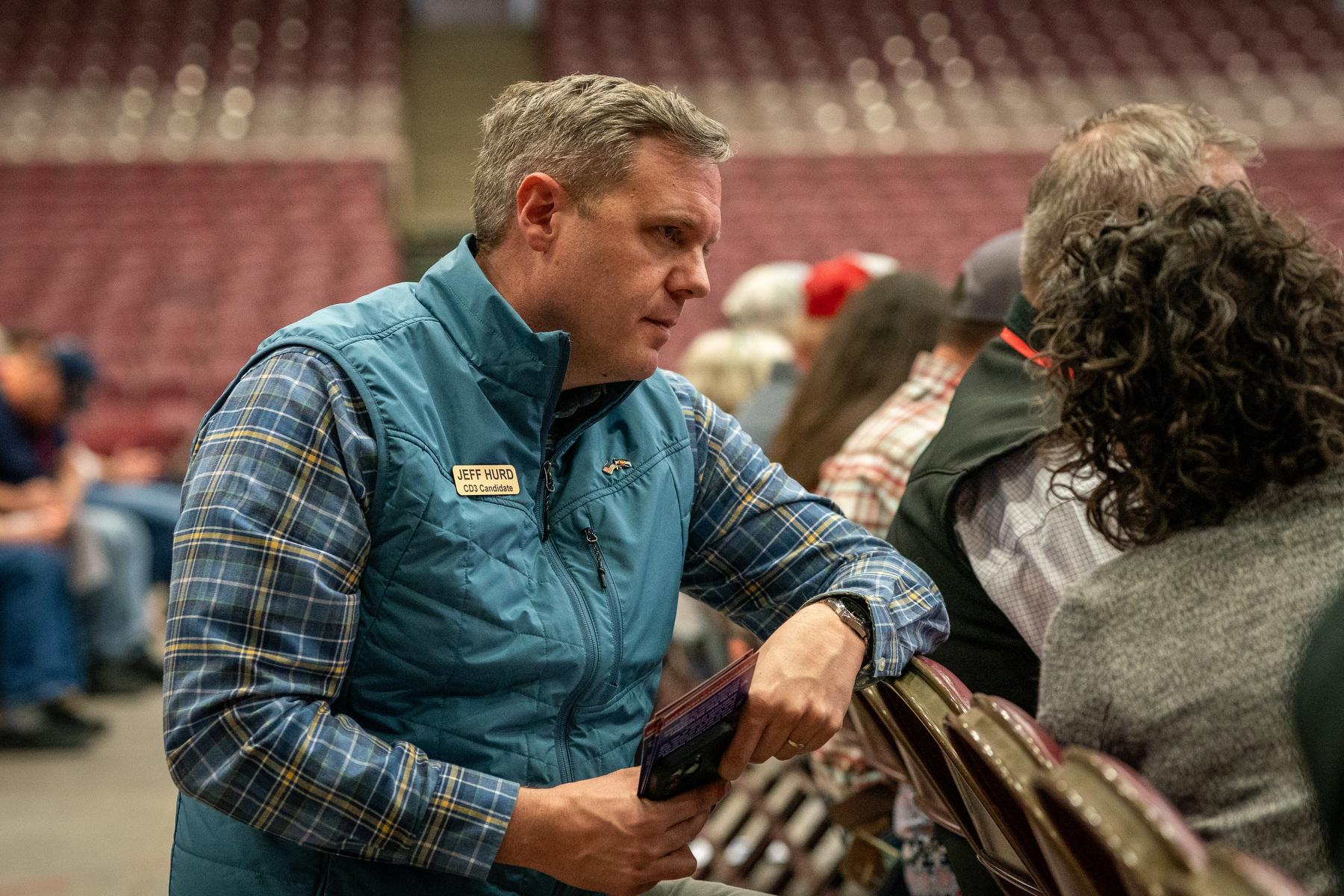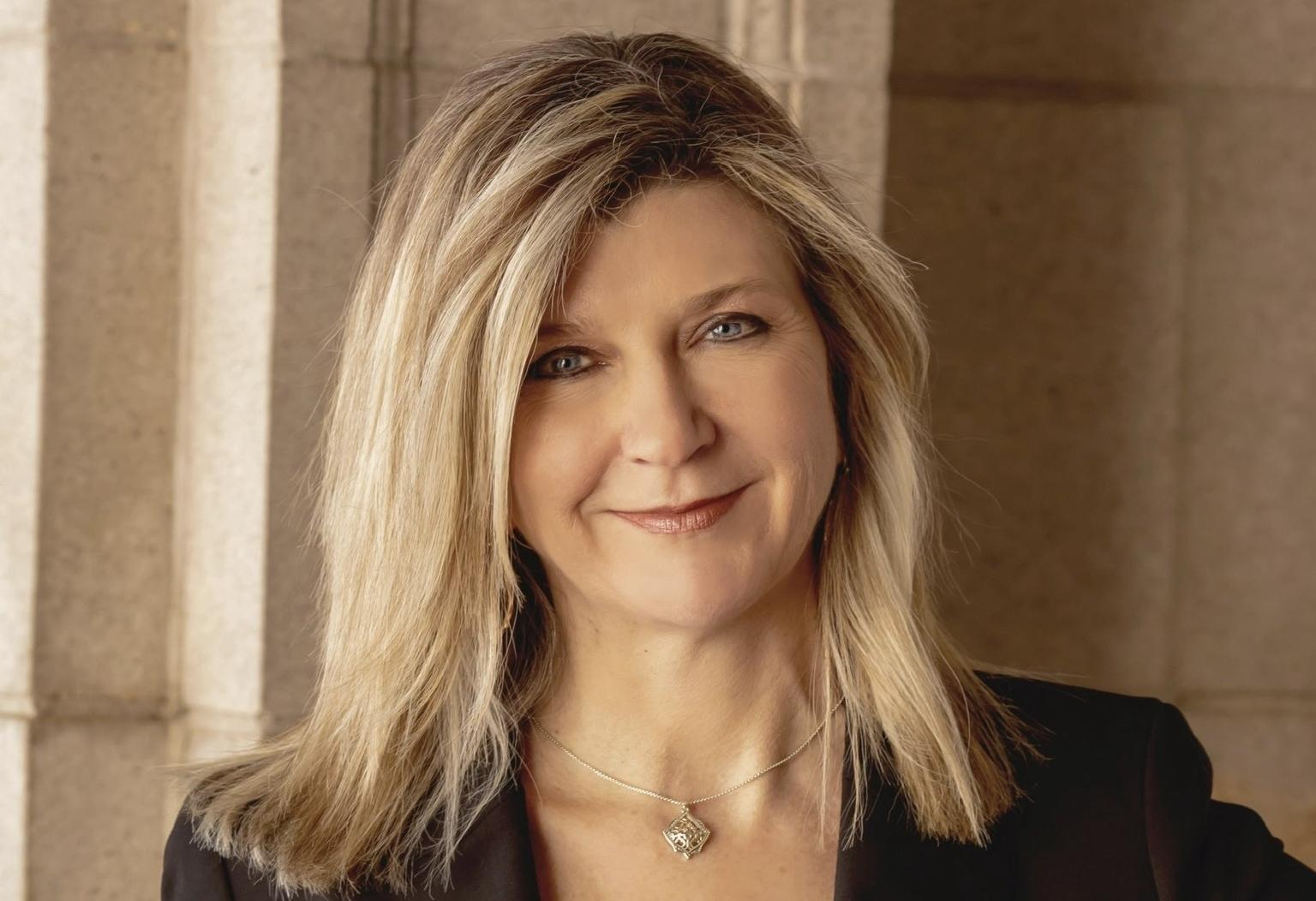
Republican Jeff Hurd is a Grand Junction Attorney. He won the Republican primary after the current incumbent, Rep. Lauren Boebert dropped out of the race and moved to run in a different district. Originally, Hurd entered the race to challenge Boebert and offer the district a GOP alternative, racking up a number of endorsements from several current and former state Republican officials.
Hurd, who has never held elected office before, served a chair of the board of the Grand Junction Area Chamber of Commerce. He has said the district needs a hardworking representative focused on doing something rather than being someone.
Hurd grew up in Grand Junction. He has five children with his wife, Barbora, who is a naturalized citizen from the former Czechoslovakia. He graduated from Notre Dame and Sturm College of Law at the University of Denver. He also has an advanced degree from Columbia Law School.
CPR News is part of Voter Voices, a statewide effort to ask Coloradans what issues matter most to them in this election. We used those responses to develop the questionnaire CPR sent to major party candidates.
Jeff Hurd on the economy and cost of living
What would you do, as a member of Congress, to address the cost of housing?
The cost of housing is a critical issue in western and southern Colorado. While the federal government has an important role to play, state and local governments also have significant responsibilities in addressing this challenge. As a member of Congress, I would support these state and local decision-makers while working to support policies that expand housing supply, reduce regulatory costs, and encourage innovative solutions to increase attainability.
High costs of materials like lumber and steel, driven in part by tariffs and energy policies, raise housing prices. At the federal level, I would support reducing tariffs on essential building materials and promoting reliable, affordable energy to lower construction and maintenance costs.
I would also work to streamline federal regulations, including applicable environmental reviews, to make housing development more efficient and less costly. I also support more reasonable energy compliance codes and uniform building codes that change less frequently, providing consistency and predictability.
While respecting local control over land-use decisions, I will support local governments in streamlining zoning regulations and cutting red tape to encourage affordable housing. I also back reasonable, targeted tax incentives for developers in underdeveloped areas and support modular and manufactured housing as affordable alternatives.
As a Member of Congress I would also uphold tax policies that promote homeownership, such as incentives for first-time buyers and for developers building attainable rental housing in rural areas.
Finally, I will focus on improving infrastructure in rural areas to incentivize development and support increased access to financing for homebuyers and builders to spur growth in these communities.
What can Congress do to address inflation, particularly around the cost of food?
Inflation, particularly rising food costs, is a serious concern for families in Colorado's 3rd Congressional District. As a member of Congress, I would push for a comprehensive approach that addresses the root causes of inflation by focusing on fiscal discipline, energy independence, regulatory reform, and supporting our agricultural sector.
Promoting Fiscal Responsibility. Excessive government spending and rising debt contribute to inflation. Congress should prioritize reducing wasteful spending and balancing the budget to help stabilize the value of the dollar and curb inflationary pressures on essential goods, including food.
Restoring Energy Independence. High energy costs affect every step of food production and distribution. I support expanding domestic energy production to lower costs for farmers, transporters, and consumers, helping to reduce overall food prices.
Cutting Regulatory Burdens. Overregulation drives up costs for farmers and ranchers, leading to higher food prices. Congress should work to eliminate unnecessary regulations and streamline those that impact agricultural production to help lower costs and improve efficiency.
Strengthening Supply Chains and Supporting Domestic Agriculture. Strengthening domestic supply chains and investing in infrastructure can help prevent disruptions that lead to higher food prices. Supporting local food production and agricultural innovation can also make our food supply more resilient and cost-effective.
What are your views on raising tariffs on foreign goods?
Tariffs can be useful to counter unfair trade practices, protect national security, or ensure fair competition for American businesses. However, broadly raising tariffs can lead to higher costs for American consumers and businesses, particularly in sectors like agriculture, construction, and manufacturing.
Instead of broadly raising tariffs, I support targeted trade policies that address specific unfair practices while strengthening our domestic economy by reducing regulations, lowering taxes, and encouraging innovation. This approach keeps American businesses competitive without the negative impacts of broad tariff increases.
Jeff Hurd on democracy and good governance
What are your top three ideas for reforms to make Congress work better?
Enforce Fiscal Discipline: Congress must address the national debt and runaway spending. I support implementing a balanced budget amendment to the Constitution, requiring Congress to spend within its means. Additionally, adopting a more transparent budget process that eliminates wasteful spending and encourages long-term planning would help restore fiscal responsibility.
Streamline the Legislative Process: I support reforms that limit the use of omnibus bills, which bundle unrelated issues into massive, hard-to-read packages. Instead, Congress should move toward single-issue bills that are debated and voted on individually. This would increase transparency, allow for better public understanding, and encourage accountability.
Increase Accountability and Transparency in Congressional Operations: To rebuild public trust and ensure members are acting in the best interest of their constituents, I support measures that increase accountability and transparency in Congress. This could include limitations on buying and selling individual securities by members of Congress, enhanced reporting of lawmakers' financial interests, and more robust oversight of committee activities. These reforms would help prevent conflicts of interest, reduce the influence of special interests, and ensure that Congress operates more openly and accountably.
If control of the federal government remains divided between the parties after the election, how do you plan to be effective for your district?
Regardless of whether the federal government remains divided, I will be effective for Colorado's 3rd District by focusing on practical, bipartisan solutions that directly impact our community: Building Relationships Across the Aisle: I will work with members of both parties to find common ground on issues like water, rural healthcare, and infrastructure—areas where cooperation is possible.
Focusing on Local Issues with Broad Appeal: I will prioritize local and regional concerns that can attract bipartisan support, such as expanding broadband, improving infrastructure, and supporting agriculture.
Engaging in Bipartisan Caucuses and Coalitions: I would strongly consider participating in bipartisan caucuses, like the Problem Solvers Caucus, to build coalitions and negotiate solutions that benefit our district.
There is an initiative on Colorado’s ballot to do away with party primaries and institute ranked choice voting. How will you vote on it and why?
I plan to vote against the initiative. While I understand the desire for election reforms, I believe ranked choice voting (RCV) comes with significant drawbacks.
First, RCV can be confusing for voters, leading to unintended consequences and disenfranchisement. We have seen instances in other states where voters were confused by the ranking process, resulting in a higher rate of ballot errors and spoiled ballots.
Second, eliminating party primaries undermines the role of political parties in helping voters understand candidates' values, principles, and policy positions. Primaries allow voters to choose a candidate who represents their party's core values and ideas.
Lastly, I believe that election reforms should prioritize clarity, transparency, and simplicity, ensuring every vote counts as intended. I am concerned that RCV undermines these principles.
Do you trust the current electoral system in Colorado? What about the rest of the country?
Generally, yes, though I believe more can be done to advance efficient elections that are fair, transparent, and resistant to fraud.
With respect to Colorado, County Clerks in the 3rd Congressional District have suggested ways to advance election security in Colorado. For example, we can improve the process for identifying and removing duplicate or outdated registrations on the voter rolls. The current system can be inefficient. For example, while members of the public often help identify outdated registrations, laws can restrict how Clerks act on this information. (For example, if a member of the public receives a ballot for a person that does not reside at that address and brings the ballot into the election office, the Clerk cannot make that voter inactive. Rather the Clerk must receive the ballot back through the U.S. Mail to make the voter inactive.)
There are also ways we should enhance coordination among state election officials outside of Colorado to ensure the accuracy of voter rolls and prevent voters from casting ballots in multiple states in a single election.
Implementing reforms like these will enhance the integrity of our elections and, importantly, increase public trust. When voters feel confident that the system is secure and that every vote is counted accurately, it strengthens the foundation of our republic.
Jeff Hurd on immigration
How should the U.S. Congress address current and future waves of people crossing at the border?
Securing our borders and enforcing immigration laws are essential to maintaining our nation’s safety and sovereignty. In Congress I will work to ensure that the Department of Homeland Security achieves full operational control of our southern border. This Includes:
Resuming Construction of the Border Wall and Infrastructure: Prioritize high-traffic and high-risk areas to reduce illegal crossings.
Leveraging Advanced Technology: Increase the use of surveillance systems, drones, and sensors to monitor and detect illegal crossings and drug trafficking, particularly fentanyl, which often enters through legal ports of entry.
Strengthening Penalties and Collaboration: Support stronger penalties for human smuggling and trafficking and promote collaboration among federal, state, and local law enforcement.
Ensure Law Enforcement Resources: Border Patrol and law enforcement must be given all resources necessary to enforce the law.
Asylum Reform: Our asylum system is currently overwhelmed and prone to abuse. I support reforms that streamline the asylum process to reduce fraud and ensure legitimate asylum seekers are processed efficiently. This would involve secure processing centers, expanding capacity to handle claims swiftly, and increasing the number of immigration judges to address the backlog.
Promoting Effective Temporary Worker Programs: Colorado’s agricultural sector and other industries depend on seasonal and temporary workers. I support reforming and expanding temporary worker programs to meet labor demands while ensuring these programs are fair, efficient, and enforceable. This approach helps our economy while maintaining control over who enters and exits the country.
Enforcing the Rule of Law: An effective immigration policy must also ensure that those who violate our immigration laws face appropriate consequences. We need to enforce immigration laws consistently and fairly.
Encouraging Legal Immigration and Citizenship: We should continue to encourage those who wish to come to the United States legally and contribute to our society. America has always been a land of opportunity, and legal immigration strengthens our communities and economy. The path to citizenship must be clear, fair, and encourage integration into American society.
Name one aspect of the current legal immigration system the U.S. Congress should reform or abolish, and why?
As mentioned above, our asylum system is currently overwhelmed and prone to abuse. I support reforms that streamline the asylum process to reduce fraud and ensure legitimate asylum seekers are processed efficiently. This would involve secure processing centers, expanding capacity to handle claims swiftly, and increasing the number of immigration judges to address the backlog.
What should the U.S. do about people who have lived in the country for a long time without documentation, including so-called Dreamers?
For Dreamers (those who were brought to our country illegally as children), I support a path to legal status that recognizes their contributions to our country, provided they have otherwise followed the law and meet certain criteria, such as having completed some education, maintained employment, or having served in the military.
What do you think of former President Trump’s call for mass deportations?
I understand why many support calls for mass deportations, especially when they see the influx of drugs and crime impacting their communities. The safety and well-being of our citizens must always come first, and we need to take strong action against those who break our laws and pose a threat to public safety. Enforcing our immigration laws and securing our borders are essential to maintaining our nation’s safety and sovereignty.
However, I believe that mass deportations are not the most effective way to address the complex challenges of our immigration system. Instead, we should focus on targeted enforcement against those who are involved in criminal activities, such as drug trafficking and gang violence.
Jeff Hurd on climate and natural resources
What is the most pressing environmental or natural resource issue facing Colorado?
The most pressing environmental and natural resource issue facing Colorado is water scarcity. With a growing population, prolonged droughts, and increasing demands, Colorado's water resources are under significant strain. This challenge is particularly acute in rural areas like those in Colorado’s 3rd Congressional District, where water is vital for agriculture.
In Congress I will protect the Colorado River Compact of 1922, advance projects that provide for more high-altitude distributed water storage, push to eradicate invasive plant species, and hold California, Arizona, and Nevada accountable for managing their water use within their legal allocations.
I strongly oppose attempts to export water out of the 3rd Congressional District, including the Colorado, Rio Grande, and Arkansas River basins. I will collaborate with local leaders to ensure that water is used to sustain agriculture, local communities, and the environment.
What are the most urgent steps the country should take to address climate change, if any?
We must address this issue through thoughtful energy policy that promotes economic growth and human development. The federal government should focus on permitting and regulatory reforms (for both traditional and low-carbon resources) that facilitate responsible energy production.
Colorado’s 3rd Congressional District can responsibly produce energy better than anyone else. We have key resources for responsible energy development—including high-quality coal, natural gas, uranium, and minerals crucial to renewable projects—that can lead to reliable, abundant, and affordable energy that substitutes for higher-carbon fuels abroad. Exporting Colorado energy also protects our allies from energy blackmail from countries like Russia or China.
When the federal government facilitates energy development in Colorado, it enhances national security for our country and economic security for Colorado families. It means lower costs at the grocery store, at the gas pump, in electric bills, and throughout the economy. It means tax and lease revenue to our communities. And it also means higher-paying blue-collar jobs, which in turn foster more stable families and stronger communities.
Should the federal government take steps to limit new oil and gas production on public lands?
I do not believe the federal government should take steps to limit new oil and gas production on public lands. Energy production on public lands is crucial for Colorado's economy. This is particularly so in rural areas like Colorado’s 3rd Congressional District, where it provides jobs, supports families, and generates essential tax revenue for schools and local communities.
Limiting new oil and gas production would hurt these communities and undermine our energy independence. Instead, I support responsible energy development that balances economic growth with environmental stewardship. This includes streamlining the permitting process, ensuring regulatory certainty, and encouraging the use of advanced technologies to minimize environmental impact.









